- Home
- Storm Jameson
The Black Laurel Page 4
The Black Laurel Read online
Page 4
Arnold turned his head on the pillow.
“Is she clever? You know I loathe parties. They bore me and I don’t know the language.”
How young he is, Edward thought indulgently. He felt himself immeasurably wiser, older, better balanced.
“No, you’ll like her. It’s not one of your mother’s parties — all the bores of the not-too-Left —” the fifth-rate bores, he thought swiftly — “it’s an amusing world; if you find a hairdresser there you can be sure he only touches fashionable heads, or coroneted ones, and is rude to his clients. Cocteau designed a wall-paper for her. You’ll meet journalists, diplomats, dancers — but only if they know how to be amusing and behave themselves. You can say anything there, the more devastating the better — but you must know your way about.”
Arnold got up, unwillingly.
“Well, if you must.”
He looked himself over casually in the mirror. Edward took more time to adjust his belt and pull his jacket into place; then he, too, walked over to the window. For a moment they stood side by side, staring at the tapestry of roofs, threadbare in the sun of an August evening: on the horizon a steeple caught the rays and became, for a brief instant, a fountain of light.
“Well, we’re alive,” Arnold said lightly.
“It wasn’t such a bad war. I wouldn’t have missed it.”
“We were lucky.” Arnold stretched himself. “Good thing it missed you.”
“You too,” Edward said quickly, gently.
Mrs Brett’s flat was a large one in a building on the Embankment. As if he were seeing it with changed eyes — or with Arnold’s — he noticed this evening that it had the elegance and proportions of a factory. They were expensive flats.
When the maid let them into the hall they heard a woman’s voice, loud, clear, roughened, the powerful voice of a fishwife. Arnold raised his eyebrows.
“No, no,” Edward smiled. “That’s Hannah Markham. She designs clothes. She was the first person to use cheap coarse cotton for dresses and charge a hundred guineas for it. She’s a genius. She goes everywhere — and why not? She earns her supper.”
He hoped a little that Arnold was impressed by the room, though he would never show it. It was immensely long: five windows looking over the Thames; on one wall a spiral drawn diagonally across in red crayon and signed by the artist. Mrs Brett was at the far end of it. As always in the first moment of seeing her, he felt nervous, then excited and moved: she was beautiful and she had fallen in love with him.
“How are you, my dear?” he said lightly. “This is Arnold. I told you about him — Flight-Lieutenant Coster.”
Mumbling something, Arnold smiled warmly. You would have said that he was enormously taken with her. He has no idea he does it, Edward thought, amused.
A woman standing with her back to them appeared to be naked well below her waist: she turned round: in front, her dress was of a nun-like decency and severity, drawn up in dark folds under her chin. She had the face of a girl, sunburned and glossy, over which an expression of maturity hovered, unable to fix itself in the bright eyes or on the mouth, and throwing a shadow over both.
“Oh, it’s you, Edward West.” When she smiled you saw the double row of strong teeth, back to the opening of her throat. “So you’ve survived. Well, I’m very glad.”
“Thanks, Hannah.”
Less than five years ago, he thought, I should have been flattered. How I’ve changed! Turning, he saw an elderly man smiling at him with deliberate friendly insolence. All the most distinguished flunkeys are here this evening — dressmakers, hairdressers —
“Ah, Yuri,” he said pleasantly, “you look very well.”
Yuri was not a Russian — he pretended to be. Born in some decent lower middle-class English family, he had lived himself into his half arrogant half perverse elegance.
“H’are you?” he answered in a languid voice. “How’s y’r friend Harden? Lord Harden.”
“All right. But he lost a leg.”
“Did he? How tiresome for him.”
Edward glanced round quickly and saw that Arnold had retreated into a window; he was smiling in the way that meant he was bored to death. Leaving Yuri in the middle of a phrase, Edward went over to him. At this moment the door opened again, and let in a middle-aged man, plump, with a gross inquisitive face. He greeted Mrs Brett and stood talking to her: his face twitched all over, eyelids, cheek muscles, lips.
“What’s the matter with him?” Arnold muttered. “St Vitus’s dance?”
“No. Intelligence. Feelings of guilt or anxiety. Name of Cecil Cowley. Highly-cultivated avant-garde critic. You ought to have guessed the last — reactionaries are usually healthier.”
“What an ass.”
The newcomer turned his head. He saw Arnold and came towards him, with a friendly smile, in which there was something humble and covetous. How he would like to be still young, Edward thought maliciously, and how miserable his longing makes him.
“I remember you,” Cowley said, with an eager little smile — lost in the shifting morass of his face. “We met, didn’t we, a few days before the war, at Evelyn Lamb’s. What have you been doing?”
“Nothing very much,” Arnold said coldly. “Flying.”
“Ah. One of our destroying angels.”
“Cecil,” Hannah Markham said.
Her voice fell on the critic like a thunder-clap in his ear: he started violently.
“You’re the chap I want. Before you came in Mary was saying it’s sacrilege to use surrealism for dresses. What’s your idea?”
“Sacrilege?” Edward interrupted. He felt at once spiteful and contemptuous. “My dear Hannah, do you know the difference between profane and sacred?”
“I know enough. I follow my nose —” it was fine, straight, and jutted from her face like a prow. “And what I smell is a nice garlic of extravagance and giddiness. Y’know, we’re down to the bottom of the pot. And that reminds me — the dinner dress I was telling you about, Mary, the copy of a religious garment, neck to ankles in dark brown cloth, I button it on the shoulder with tiny doll’s-house chamberpots. Delicious. That’s what I mean, the surrealist touch — but you mustn’t overdo it. Yuri, you devil, you’re laughing at me.”
“My good girl, of course not,” Yuri said in his flattened voice.
He has squeezed the life out of his voice, Edward thought. And how he envies her her vulgarity, her energy — she does what she likes. He checked himself, disagreeably astonished . . . But I admire it, too.
“I was envying your lack of decency,” Yuri said, with an impudent smile. “And your voice — Why didn’t I think of bawling like an ox? Oh, well. I’m a coiffeur, I might say a creator, de dames — it might not have gone down with them, coming from me. As for surrealism, you don’t know what you’re talking about.”
“Hannah thinks with her nose, like a spaniel,” Edward said pleasantly, “she only picks up dead birds.”
“Bah,” Hannah said, “I know what I know.”
Cowley had watched her with eyes still alert behind their film of vanity and self-pity.
“We survivors — from the last really civilised years — mustn’t make a fuss. I’m writing my last book, the last I shall write. I call it I lie in my grave.”
“Very likely you do,” Edward said. “But why write about it?”
Mrs Brett seated herself near him. Looking down at her without moving his head, he had a foreshortened view of her face, of the finely arched nose, the smooth line from temple to chin, the delicate brows. Her hair, black, and so cunningly waved that it appeared natural, was drawn back to show her small ears. Seen like this from above, the planes of shadow falling across it gave her face a curiously battered look, as of a beautiful object which has been left knocking about. Edward felt that pity which is half repulsion. She is really old, he thought.
As if she knew what he was thinking she turned her face to him, sideways and up, with a challenging smile. He smiled back coolly, but he was no long
er cool.
“But Cecil is right,” she cried: “what is civilisation if it’s not the right to question everything? Yes, everything. That’s growth, that’s freedom. And we’re losing it. Think of Russia. Think what it will be like after the next war.” She shivered. “I do hope I shan’t be alive.”
Yes, you would be no use in a place like Berlin, he thought severely.
“But the crime, the real crime,” Cowley stammered, “of modern tyrants is that they have no manners. Democracy ruined manners, the atomic bomb is the height of bad taste. No society which knew how to behave would sink to such tricks.”
Edward began a tart reply, and stopped. I can’t argue with a man who thinks that manners can exist without a moral code. . . Outside the windows it was almost dark. A breeze coming off the river swelled the curtains.
“I’m goose-flesh all over,” Hannah protested.
Yuri bent over her, smiling into her face, and pressed his thick blanched fingers into her spine.
“Shut the windows, darling.”
Both young men moved to obey. We shouldn’t have come here, Edward thought. He glanced at his friend with an apology behind the glance, and at once felt that he had no need to apologise, Arnold was with him, as uncritically as when they were children. Without speaking, they moved from window to window; drawing the curtains, they shut out the river and the few weak lights trembling in it. Behind them, Yuri was giving Hannah sarcastic advice. “You should arrange your hair to exaggerate your nose, not try to subdue it. All those spiteful curls only make you ridiculous. Here.” He began pulling it about. Mrs Brett watched, with a mocking yet avid smile. She stood up.
“Come into my bedroom, both of you. You need a glass.”
A door in the corner led into a second long room: walls covered by grey quilted satin; in an alcove, an emaciated wooden image, almost a skeleton, its exaggerated male organs supported on one of its hands.
The first time Edward had seen this he had pretended to admire it. Indeed he had admired what seemed to him the courage, the intoxicating cleverness of putting the thing in a living-room. Now he was not sure. Was it clever or only — loose?
“What d’you think of it?” he asked Arnold.
“What is it?”
“Melanesian — ancestral image. Mary had it in this room when it was still fashionable to be lewd. I believe it’s worth money.”
“Ridiculous.”
Cowley ambled towards them and with real amiability asked Arnold again what he had been doing. Before he could make the curt answer on the end of his tongue,
“He’s been bombing Europe,” Edward said mischievously, “to let you lie quietly in your comfortable literary grave.”
Cowley ignored him.
“Life must be very tame now that you have nothing to destroy. What are you going to do?”
“I’m still flying.” Arnold looked at him with polite hostility. “I’m private pilot to William Gary. I can’t say I find it tame.”
Cowley’s sallow face quaked like the surface of a bog. He spoke with a despair both young men felt to be ridiculous.
“What a fatal war it has been! To think that Europe has been destroyed, finished, only to keep people like Gary in their seats.”
“Why not?” Arnold said. A flush of rage darkened even his eyes. “Someone must be in charge.”
“Cecil,” Hannah Markham shouted. “Come here, we want your advice.”
They watched him rolling his body into the other room.
“He’s been working during the war,” Edward said. “He flew from airport to airport for your father’s Ministry — with all the other distinguished war vultures — Darling! You here too! Mary did her share of it, I’m sorry to say.”
“Need we stay here any longer?”
“Of course not. Why should you be bored on your one evening?”
He was in a hurry to retrieve the false step he had made in coming here. Raising his voice,
“Mary — we must go.”
“I’m afraid you were bored,” she said to Arnold, in a deep voice, as if she were really sad, “and you won’t come to see me again.”
He gave her his quick and sweet smile. It meant, as his friend knew, nothing at all except that he was uninterested.
“Not at all. I enjoyed myself. It was good of you to let me come.”
“Then please come again.”
“I’m afraid I’m going off to-morrow. I came from Scotland this afternoon.”
“Really? Where were you living in Scotland?”
“In Argyllshire — Glen Avie. My employer has a house there. Avie Lodge.”
“Then — but you know my husband,” she said gaily. “And Lise.”
“I’ve never seen your daughter,” Edward interrupted.
“You will soon,” she said swiftly, turning again to Arnold. “I sent her away from London at the beginning of the war, you know. Think of it — when it began she was only eleven — a little girl, very small for her age. She’s seventeen now. She’s going to live with me again. In fact she’s coming this evening. You may know — my husband is being moved to Berlin. I can’t send her back to her nurse.” She laughed. Her hand pulled the folds of her dress. “Or to Berlin.”
“I suppose,” Edward said, smiling, “your husband is very pleased.”
“You know him,” she said ironically. “He wrote that he was going back to a decent life. What little I remember of garrison life — it will be a garrison, won’t it? — was barbaric in the extreme.”
He glanced at her as if he, too, found her husband ridiculous. He felt a twinge of shame — not because they were, as we say, deceiving him. To pretend to despise Colonel Brett went against something deeper in him than his cleverness.
“Oh well, our good Humphrey is a barbarian of the finest sort,” he said pleasantly. “He knows how to enjoy a war.”
He felt Arnold’s impatience to be off.
“Good-bye, Mary, my dear,” he said, smiling into her face to reassure her.
When they were outside her door and waiting for the lift to come up, Arnold said in a casual voice,
“I like Colonel Brett. He struck me as a good man.”
“Of course he is.” Without the social duty to be cutting and ironical, he could say what he felt, and he was glad to purge his conscience. “He’s upright and singleminded, selfless, decent. He belongs, you know, to an old military family. Traditions and all that. It would never occur to him to talk, like that ass Cowley, about civilisation coming to an end, because he knows what he was born for — to behave in any circumstances exactly like his great-great-grandfather who was a friend of Falkland’s in the Civil War. He’s very intelligent, the only foolish thing he ever did was to marry a woman like Mary — even that was at least partly a duty. She was the sister of his closest friend, killed in the last war; they had no parents, and she was poor and very young. He couldn’t know how she would grow up.”
He hesitated. In a lighter voice, he went on,
“I’m afraid he may be disappointed in Berlin. He certainly won’t join in the scramble for jobs, and he’ll probably be trodden down — some subordinate determined to get on. I may be wrong.”
Outside the building the square was pitch black, without street-lights: a cab drew up at the curb and a girl stepped out, pulling after her a suitcase and a dog. In the feeble light from the cab she searched in her purse, paid the man, and went into the house without looking at the young men.
Edward had stared at her shamelessly. She was very young, very attractive.
“That was Lise Brett,” Arnold said.
“Why on earth didn’t you speak to her?” His friend’s shyness — or indifference? — annoyed and amused him.
Arnold shrugged his shoulders.
“Haven’t you had enough female society for one evening? Come on, if we hurry we shall be in time for a drink at my so-called club.”
The taxi was already moving off, and Edward shouted to stop it. “In you get.” He fell into
it, over Arnold’s feet, as it jerked like a paralytic towards the endless perspective of dark streets, with uprushing fountains of darkness which were trees.
“Thank heaven that’s over.” Arnold groaned with relief. “Why the devil do you go to such houses? They bore me to death.”
Edward burst out laughing at him.
Chapter Six
The instant of acute fear when the aeroplane left the ground vanished, as always, before, or almost before he need notice it. This time he tried to pin it down. How long was it, how many years, since what used to be a single instant of sharp painful excitement became fear? Is it, he asked himself, only a question of degree? Is fear, panic, inseparable from joy — so that the nerve saturated with one begins fatally to feel only the other? But already the thread had snapped; he was free: no longer detached from him, the aeroplane moved with him, an outgrowth of his brain, hands body. With part of his attention to it become unconscious, he had infinite time round him for his thoughts.
The first that came to hand had been plaguing him at moments since the glimpse he caught the night before of Lise looking for her money in the light — it was scarcely that — falling on her from the cab. Something, her face profiled on the darkness, or the movement of her head when she turned it quickly, had pierced him with a sense of familiarity. It was almost a recognition — and it eluded him in the very effort he made to seize it. It had lasted for so brief an instant. As soon as she opened the door of the house the light from it pouring over her had swept away at once the — what was it? — memory? or only a fantasy?
Irritated, he dismissed the whole thing. If there’s anything, he thought, it will show up later.
This was the first time he had flown over Europe since May, since the end of the war. The first time that he was not — a derisive smile, derision and dislike, altered his face — a destroying angel. (What an ass!) He tried to think about his last — at the time he had not known it would be the last — flight: he could remember details but the thing itself had gone, sunk, as tracelessly, bleakly, as those friends of his who from this or that raid did not come back. It was, that did not come back, unthinkable, a door slammed in your face, a back, shapeless in flying kit, seen disappearing, the gleam of a smile, then nothing. I, too, he thought. The young man who knew intimately those others — who had, so to speak, lived them — he too was gone, with almost everything he had thought, felt, known. His successor, heir to so many irrealisable moments, so many ghosts, so much and now unfathomable silence, was free. Free for what? A slight giddiness seized him when he leaned over the future. He drew back. Now, now, no nonsense, he thought severely.

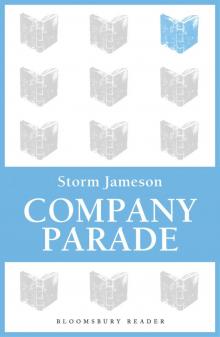 Company Parade
Company Parade The Lovely Ship
The Lovely Ship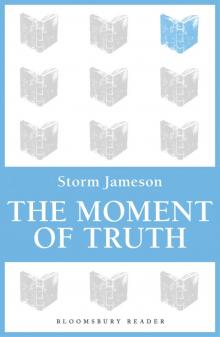 The Moment of Truth
The Moment of Truth The Road from the Monument
The Road from the Monument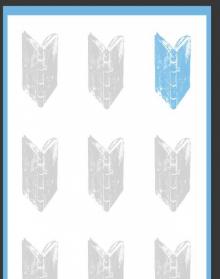 The Journal of Mary Hervey Russell
The Journal of Mary Hervey Russell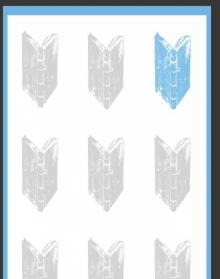 The Black Laurel
The Black Laurel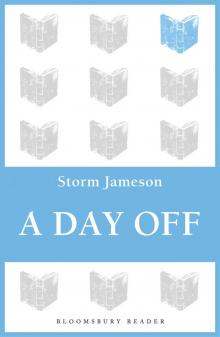 A Day Off
A Day Off